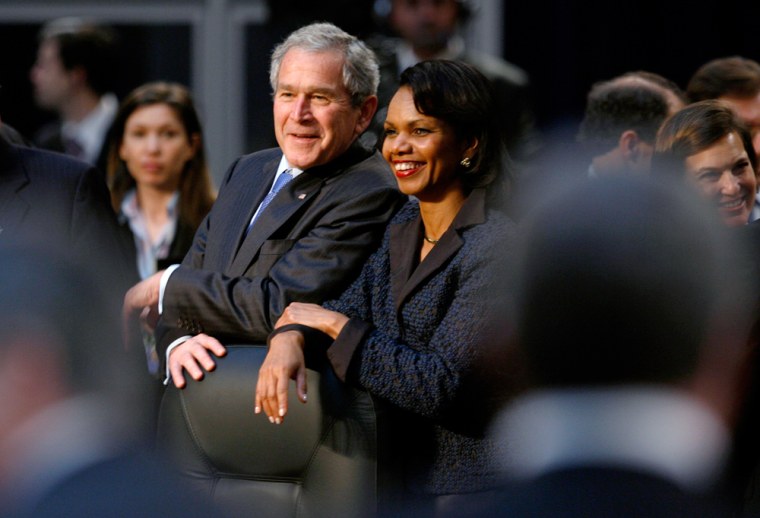President Bush won NATO's endorsement Thursday for his plan to build a missile defense system in Europe over Russian objections. The proposal also advanced with Czech officials announcing an agreement to install a missile-tracking site for the system in their country.
Bush also was undaunted in his drive to see the military alliance expanded further eastward, despite facing an immediate setback.
Fellow NATO leaders rejected his appeal to allow Ukraine and Georgia to get on a path toward membership but they declared in a communique that both former Soviet republics would eventually join the alliance
Georgian Foreign Minister David Bakradze described the statement as a "historic breakthrough."
Bush's national security adviser, Stephen Hadley, said the president will not drop the issue and plans to make a new pitch before he leaves office in January. The United States expects to raise the matter at a meeting of NATO foreign minister in December, Hadley said.
"NATO's door must remain open to other nations in Europe that share our love for liberty and demonstrate a commitment to reform and seek to strengthen their ties with the trans-Atlantic community," Bush said in brief remarks at an alliance meeting. "We must give other nations seeking membership a full and fair hearing."
Diplomats said the alliance would offer a statement saying NATO's door will remain open if Ukraine and Georgia move ahead with political and military reforms and build support for NATO among their citizens.
Bush's regret
The president expressed regret that NATO also declined to offer full membership at this meeting to Macedonia. The invitation was blocked by Greece, which says the country's name implies a territorial claim to its northern region, also called Macedonia.
"Macedonia's made difficult reforms at home," Bush said. "It is making major contributions to NATO missions abroad. The name issue needs to be resolved quickly so that Macedonia can be welcomed into NATO as soon as possible."
Albania and Croatia were invited to join the alliance, now currently at 26 members.
Progress on missile defense, though, represented a boon to Bush from the summit. Russia has strongly opposed the plan.
NATO leaders were adopting a communique stating that "ballistic missile proliferation poses an increasing threat to allied forces, territory and populations."
It also will recognize "the substantial contribution to the protection of allies ... to be provided by the U.S.-led system," according to senior American officials, who spoke on condition of anonymity.
The statement calls on all NATO members to explore ways in which the planned U.S. project, to be based in Poland and the Czech Republic, can be linked with future missile shields elsewhere. It says leaders should come up with recommendations to be considered at their next meeting in 2009, the officials said.
Significantly, the document also calls on Russia to drop its objections to the system and to accept U.S. and NATO offers to cooperate on building it, the officials said.
The plan calls for 10 interceptor missiles based in Poland and a tracking radar site in the Czech Republic.
'Important step'
At a news conference in Bucharest on the sidelines of the NATO summit, Czech Foreign Minister Karel Schwartzenberg announced that negotiations with the Americans have been successfully completed and that a deal would be signed in early May.
No U.S. official was in attendance, but the Czechs distributed a joint U.S.-Czech statement that said, "This agreement is an important step in our efforts to protect our nations and our NATO allies from the growing threat posed by the proliferation of ballistic missiles and weapons of mass destruction."
The Poles have yet to agree to the plan.
The backing from NATO and the announcement with the Czechs provides Bush with a powerful leg up in his negotiations with Moscow over the issue.
Afghanistan loomed as the summit's No. 1 topic, a point of contention between some Europeans who see the NATO mission as largely a humanitarian effort and the Bush administration and others who see it as a central front in the fight against terrorism.
Canada had threatened to pull its troops from the front lines in southern Afghanistan unless other allies sent an additional 1,000 combat troops to help.
NATO has about 47,000 troops in Afghanistan, but commanders are pleading for more troops in the south, where Taliban insurgents are wreaking the most havoc. The United States supplies the largest contingent, about 14,000 for NATO, plus the United States has 13,000 operating separately in eastern Afghanistan hunting terrorists and training Afghan forces.
"We expect our NATO allies to shoulder the burden necessary to succeed" in Afghanistan, Bush said at a news conference Wednesday with Romania President Traian Basescu on a Black Sea beach.
French President Nicolas Sarkozy has offered a battalion — normally about 700 to 800 troops — for the volatile eastern region, NATO spokesman James Appathurai said. That would free up U.S. troops to move south. Appathurai said the offers on the opening day of the summit would meet Canada's demands.
Additional troops
To make up for other allies, Bush has pledged to send an additional 3,200 Marines to Afghanistan. The White House on Wednesday said the actual number would be 3,500.
Bush plans to meet with Russian President Vladimir Putin on Sunday in the resort city of Sochi, the last such session of their presidencies. Bush is also to meet with Putin's hand-picked successor, Dmitry Medvedev.
The White House is holding out hopes of an agreement easing Russia's opposition to a missile shield.
Bush said Putin should not fear NATO, but rather should welcome the alliance because it "is a group of nations dedicated to peace."
